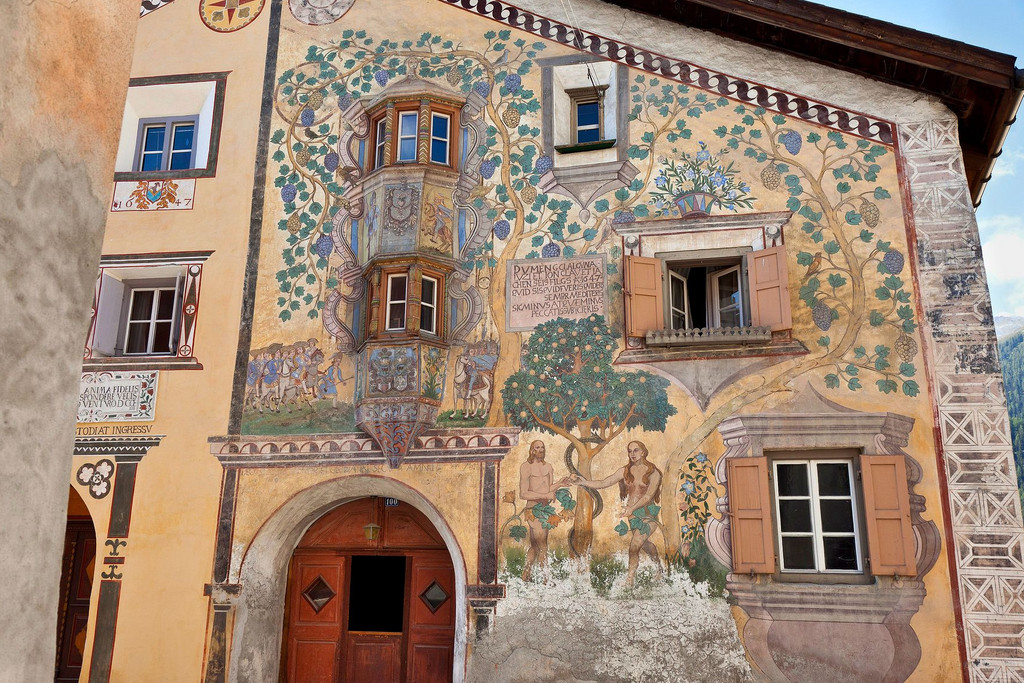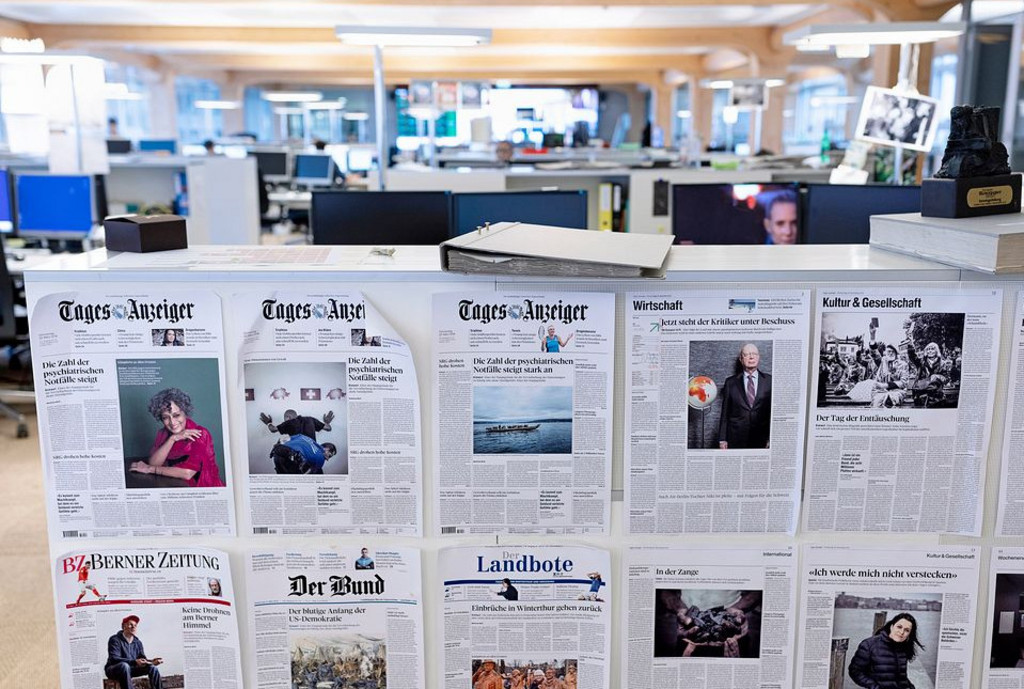“There is a severe lack of money in the journalism sector,” says Manuel Puppis, Professor in Media Systems at the University of Fribourg. He illustrates this alarming observation with some stark figures. Only 20 years ago, 1.7 billion Swiss francs in revenue from advertisements and job postings flowed into the coffers of newspaper publishing companies on an annual basis. Printing machines ran at full capacity. The onset of the digital age saw advertising move increasingly over to the Internet. According to Puppis, paid-for newspapers in Switzerland only generated around 500 million Swiss francs from advertising in 2018. Publishers could only offset a small amount of this shortfall through advertisements on their online platforms. On the other hand, Internet giants such as Google and Facebook are making big money. As much as 1.4 billion Swiss francs of the total 2.1 billion Swiss francs earned from online advertising in Switzerland in 2017 went to search engines. Display advertising on websites and apps accounted for only 265 million Swiss francs – with only a fraction of this amount going towards the journalism sector.
One editorial team, several publications
In recent years, Swiss media companies have responded to the dramatic slump in advertising revenue by concentrating and merging their editorial teams, or even closing institutions such as most recently “Le Matin” in French-speaking Switzerland (see secondary text). This has not only cost hundreds of jobs but also been detrimental to journalistic diversity.
It is of course cheaper for publishing houses to produce all cross-regional content in one place, explains Puppis. “However, if only a small number of market players are producing copy for a national audience, this limits media plurality.” For example, Zurich-based Tamedia has a central editorial department that currently provides 13 daily newspapers within the Zurich-Basel-Berne triangle with all the national, foreign, business, culture and sports news that these outlets need.
Meanwhile, CH Media – a joint venture between AZ Medien and NZZ-Regionalzeitungen – will soon be supplying 19 daily newspapers, including the “Luzerner Zeitung” and “St. Galler Tagblatt”, with national news coverage from its Aarau-based central editorial office. “Blick” (Ringier), “Neue Zürcher Zeitung” and the online platform of the Swiss Broadcasting Corporation (SRG SSR) remain the country’s independent media voices.
Losing regional perspective
Switzerland still has a large number of newspapers due to the regional split editions. However, this obscures the fact that “a regional take on national events barely exists any more”, says Puppis, who believes that it is still important to “cover all geographical localities” in a federal Switzerland that practises direct democracy at national, cantonal and municipal level. Local providers have stepped into the breach in some regions. For example, online magazine “Zentralplus” produces news for the cantons of Lucerne and Zug.
“Republik” – a new ad-free, reader-funded online magazine – was launched at national level in 2018. More than 13,000 people pledged their support for the platform in record time by registering as subscribers, or “co-publishers”, even before the magazine had published its first story. The next few years will prove whether “Republik” has a viable business model. In the long run, “Republik” needs 28,000 subscribers (publishers) to balance its books. Puppis points out that both the German-language “Republik” and its French-speaking equivalent “Bon pour la tête” rely on good journalism to reach their respective communities. However, they are part of what is still a niche market. “As is the case with traditional media, all new online portals ultimately face the conundrum of how to pay for journalism. No one has found an answer yet.”
Controversy over the new Electronic Media Act
The Federal Council has also recognised that something needs to be done. Last summer before her resignation, media minister Doris Leuthard (CVP) gave the green light for consultation on the new draft Electronic Media Act (EMA), which stipulates that the 365 Swiss francs that every Swiss household pays for public service broadcasting apply not only to radio and television but also to online media, provided that the content is primarily audiovisual. By differentiating, the Federal Council wants to protect the press from subsidised competition.
Switzerland’s publishers are sceptical about the Federal Council’s proposals – nor do they want any direct press subsidies for that matter. Instead of “subsidising new online services that distort the market”, the federal government should instead help the private media sector to “manage the digital transformation”, writes the Swiss Media Association, which is headed by Tamedia’s Chairman of the Board of Directors, Pietro Supino. Specifically, publishers are calling for indirect press subsidies to increase markedly from 30 to 120 million Swiss francs per year. In addition to reducing postal tariffs, such subsidies would help to pay for early-morning deliveries of daily newspapers. This would benefit all the major publishers – including the Tamedia Group, a company that made a net profit of 170 million Swiss francs in 2017. Switzerland’s biggest media company generates earnings through commercial digital services such as the job advertisement platform Jobcloud. Critics accuse Tamedia of no longer investing in its actual core business – journalism – while still insisting that the government provide indirect subsidies.
However, in his capacity as President of Media Forti, Puppis says that the EMA is a “missed opportunity”. Media Forti is a civil society organisation that supports media policies “in the public interest” as well as “democracy-relevant journalism for the digital age”. In particular, Puppis believes that the EMA is squandering the chance to secure direct funding for online journalism as a whole, not least because this would also enable local and regional newspapers to keep pace with digitalisation.
Furthermore, the EMA might potentially be a source of party-political friction. Switzerland’s conservative-leaning parties want fewer media subsidies, while their counterparts on the left want more. Parliament is unlikely to look at this contentious issue before the end of the year – unless Leuthard’s successor, Simonetta Sommaruga (SP), has a rethink.
More “likes”, less news
The last ten years have seen a major decline in interest among young people for conventional news. According to a survey by the Research Institute for the Public Sphere and Society (Fög) at the University of Zurich, 53 per cent of 16- to 29-year-olds in Switzerland are “news-deprived” young people who mostly consume entertainment and only follow the news sporadically. This figure compares to 32 per cent in 2009. One third (36 per cent) of the entire Swiss population now miss out on conventional news altogether.
Fög refers to “global surfers”, whose share of the total population has increased from 16 to 23 per cent. Global surfers do not subscribe to paywall news sites either and prefer to read online news from foreign sources. Fög’s findings show that media consumption has grown overall, but it is mainly the global technology companies that benefit from this through their communication platforms.
Read more: Collapse of the French-language press













Comments
Comments :
Heureusement qu'on n'a pas soutenu financièrement le crieur du village quand la presse est venue.
Internet permet une diffusion tout aussi intéressante que le papier, où la législation pêche, c'est le côté pernicieux des grands groupes américains. Ce n'est pas en subventionnant qu'on supprimera ce problème, mais en faisant mieux qu'eux.
Et je ne parle pas de ceux qui voient complètement discréditée la protection de la vie depuis la conception jusqu'à la mort (forcément rétros, et repliés sur eux-mêmes), et de toutes les dérives éthiques de la procréation par autrui (forcément homophobes)
Bref la plupart de nos journalistes n'aime pas les gens DE DROITE. Trop souvent, ils utilisent les mêmes vieilles étiquettes ce qui leur permet d'esquiver confortablement tout débat : extrême-droite, fachos, populistes, rétrogrades etc. Tout gouvernement qui n'a pas forcément le modèle de chez nous est qualifié par nos journalistes automatiquement de 'régime'.
Etc. etc.
Il suffit pour s'en rendre compte de lire les commentaires sur les sites Internet de ces grands médias pour comprendre un peu mieux le décalage qu'il peut y avoir entre entre ceux qui savent tout, et leurs lecteurs, qui sont un peû plus confrontés à la vie quotidienne.